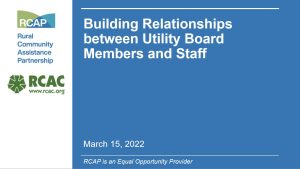
Where: Nationwide
Problem: Poor communication is a common cause of dysfunctional relationships between utility board members and operational staff of water systems.
Solution: Rural Community Assistance Corporation (RCAC) and Rural Community Assistance Partnership (RCAP) created a presentation addressing management and staff’s roles and responsibilities in maintaining a healthy environment.
Destructive relationships between utility board members and staff can hinder community water system operations throughout the United States. Ineffective communication and non-adherence to established policy and procedures undermines effective utility management, depresses staff morale and corrodes utilities’ technical and financial capabilities, with downstream impacts on community development and health. Implementing policies proactively and consistently can prevent a toxic work environment from developing, ultimately reducing staff turnover while boosting productivity and ensuring operational stability.
On March 15, 2022, RCAC Rural Development Specialist John Hamner jointly presented a national webinar titled “Building Relationships Between Utility Board Members and Staff” with RCAP Financial and Managerial Capacity Building Specialist Glenn Barnes. The project was funded wholly or in part by a U.S. Environmental Protection Agency (EPA) grant to train and assist small public water systems in complying with the Safe Drinking Water Act, as well as improving their financial and managerial capabilities.
The workshop addresses the need for small utility boards to understand what utility staff do and for staff to effectively communicate their needs to their boards. The speakers emphasized how sound policies and procedures are pivotal to encouraging healthy communication and should be reviewed as needed. Slides showcased best practices and examples of policies clearly delineating roles and responsibilities for utility board members, managers and water system personnel. The workshop also highlighted the importance of reports in maintaining healthy communication and contributing to a conducive environment. Presenters conducted polls to gauge the makeup of attendees and better understand their needs and concerns.
A total of 129 staff participated, including numerous staff from state primacy agencies throughout the West. Several state agencies have since approached RCAC to request presentations on the topic. Operators and board members have also contacted Hamner to share their experiences on the subject. The Oregon Health Authority requested the workshop and indicated a willingness to contract with RCAC directly to bring it to the state. RCAC’s California state training program will likely include the presentation in its regular curriculum.
